Ferrari are close to Mercedes but not close enough
- Published
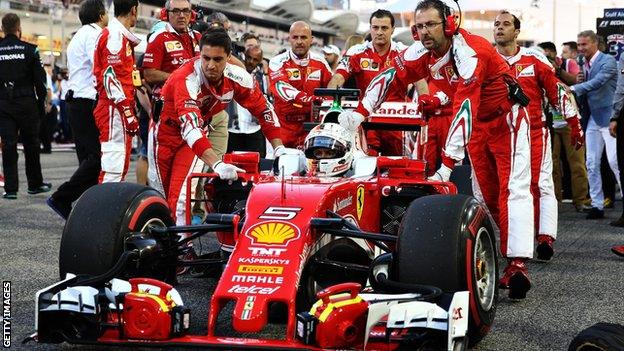
Ferrari have suffered reliability problems in the first two races
Ferrari started this season hoping to take the fight to Mercedes. On one level, they have given some indications that they might be able to do that from time to time; on another they have started the year with two very disappointing races.
At the first race in Australia, after Sebastian Vettel leapt into the lead with a good start, they handed the race to Mercedes with a strategy error when the race was stopped for Fernando Alonso's huge accident.
In Bahrain, Vettel was out before the race had even started with an engine failure - the second engine-related retirement for a Ferrari this season after Raikkonen's turbo problem in Melbourne - and Raikkonen was not fast enough to threaten race-winner Nico Rosberg.
In the past few years, reliability has been a Ferrari strength. Through Alonso's five years with the team, the car was never fast enough to win titles from the front, but he was often able to stay in contention thanks to consistent finishing.
So it's ironic that in the year in which they have made a genuine step forward in performance - if not quite enough yet - reliability looks like it is suddenly a problem.
The two things are probably not unrelated - generally the more you search for performance, the more you reduce the tolerances, and the harder it is to achieve reliability.
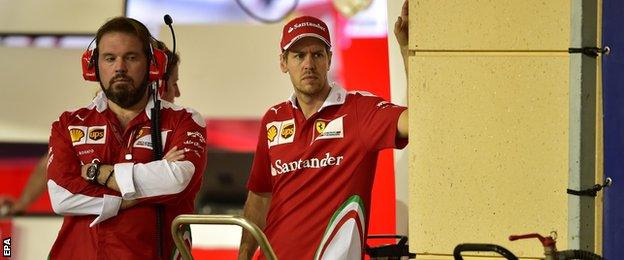
Vettel was frustrated by the engine failure in Bahrain
After Bahrain, there were questions as to whether Raikkonen could have won the race had he not made a poor start and dropped to fifth on the first lap.
Those questions were founded on the fact that Raikkonen was able to close from 15 seconds behind Rosberg at the first pit stops to less than four behind after the final ones.
But the reality is less encouraging for Ferrari. Rosberg was clearly managing his pace in Bahrain.
We should remember Rosberg had a brake temperature issue in Australia that the team were worried at one point could have led to his retirement.
Bahrain, with its long straights and slow corners, is tough on brakes, and Mercedes will have been aware of that and ensuring he was only going as fast as he needed to.
And the evidence that Rosberg had plenty in hand came from his team-mate Lewis Hamilton.
Hamilton had damaged front wing and bodywork following his collision with Williams's Valtteri Bottas at the first corner.
That will have cost a lot of performance - Mercedes reckoned it was between 0.8-1.5 seconds a lap - and yet Hamilton was still able to get back into third place and, once there, keep Raikkonen honest.
So Ferrari are close, but not quite close enough. And if they are going to make Mercedes sweat this year, they are going to have to sort their reliability out, as well as find a bit more pace in the car. That is a tough double act, as any technical director will tell you.
A shaky start for Hamilton
Hamilton has had two rocky results, caused by two poor starts, while Rosberg has had two confidence-inspiring wins.
Rosberg ended last season well, after Hamilton eased off once the title was won. No matter that Hamilton has been faster so far this year, Rosberg's wins have kept coming, as a result of his team-mate's problems.
Rosberg's family life is settled now, after the birth of his first daughter last summer, so he is coming into 2016 with a clearer mind than perhaps he was last year and it looks like Hamilton has a fight on his hands, with a 17-point deficit to make up already. This could be fun!
A cock-up over qualifying
The powers-that-be have to be happy about Hamilton needing to come back in the title fight because they are certainly not throwing up many good stories themselves, or covering themselves in glory with their decision-making.
The debacle over the change in qualifying format has been embarrassing for both F1 boss Bernie Ecclestone - who started the process off by insisting on a change pre-season - and FIA president Jean Todt, who until last week had blocked attempts to go back to the 2015 system despite the new elimination format clearly not working.
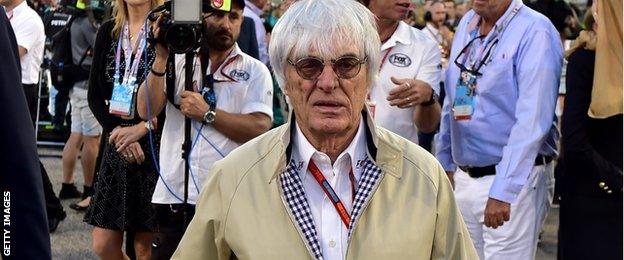
Bernie Ecclestone told teams he wanted a change to the qualifying format less than a month before the start of the season
Watching qualifying in Bahrain was like reading the last page of a spy novel while you were halfway through the story. The result was known halfway through each session and it was a huge anti-climax.
The elimination format not only failed as a spectacle, it also failed to do what it was meant to do.
It was introduced to try to mix up the grids, but it didn't.
In Australia, Red Bull's Daniil Kvyat looked out of position in 18th - but he was only 13th in final practice.
In Bahrain, Force India's Sergio Perez looked as if he had had a bad session in 18th - but he was in exactly the same position in third practice.
Then you have to question whether mixing up the grids artificially is the right thing to do anyway.
They said they were doing it to make the races more exciting and appealing to the fans. But they're not listening to what the fans want - they have been overwhelmingly in favour of reverting qualifying to the 2015 system.
So they were doing something for their customer but not listening to what he was asking them to do - which is completely insane from a business point of view.
There was muddled thinking on another level, too.
It is only two years since the FIA introduced a trophy for the person who won the most pole positions in a season. The clear implication was that being the fastest driver on a given day in history was a meaningful thing - which is simply a reflection of the way any racing driver thinks.
Trying to mix up the grids artificially flies completely in the face of that.
2016 season story so far | |
|---|---|
Thankfully, after an outbreak of common sense, Todt and Ecclestone caved into the teams' demands to revert to the 2015 system. Hopefully, that will be voted through without any hitches before the race in China this coming weekend.
But the wider problem remains - the messaging in F1 is all over the place, when what it needs is a consistent vision and one strong voice making decisions and driving the sport in a given direction.
The question is, who should that be? Because the current decision-making process is going backwards and forward more often than people change their underpants and, as a fan, that frustrates me.
Missed opportunities - and some taken
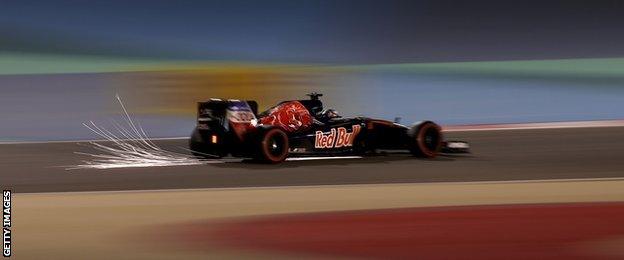
Max Verstappen finished in sixth position at the Bahrain Grand prix which ensured his team Toro Rosso picked up points at the race for the first time in its history
Rather like last year, Toro Rosso have been fast but have lost points through various mishaps.
They have a good car and two very promising young talents in Max Verstappen and Carlos Sainz. Pit-stop problems have cost them in both races and 11 points is a meagre tally with a car that is up there fighting for best-of-the-rest tag behind Mercedes and Ferrari. These lost points could be very expensive at the end of the season.
For Williams, the start of the season has been even more concerning. Third in the last two seasons - the underdog best punching above their weight - they seem to have lost their way a little.
Felipe Massa was second to Rosberg on the first lap in Bahrain, but finished one lap down in eighth place. That suggests a basic lack of performance on a track on which their Mercedes engine should give them an advantage.
Williams are a strong engineering group and a very good racing team, but they quickly need to get on top of whatever problems are slowing them down or they might find they have been leapfrogged.
One of the cars that passed Massa in the course of the Bahrain race was the Haas of Romain Grosjean, which has been one of the stand-out performers of the season.
Grosjean has scored strong points in both races, with a sixth and a fifth place, and Haas have made a very impressive debut, notwithstanding the significant amount of help they have had from their close links with Ferrari.
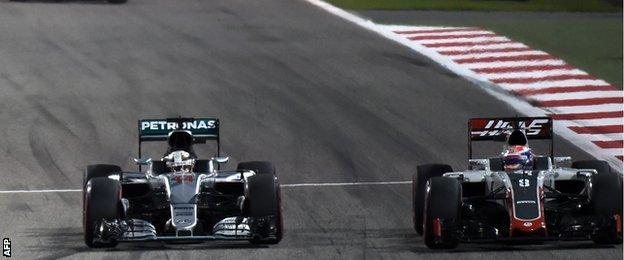
Romain Grosjean (right) drove a superb race in only Haas' second grand prix
Haas will continue to be a threat for points all year. They already seem to have a pretty good handle on what makes the car work, especially the fact that it can make aggressive tyre strategies work. That spices things up - and looks set to again in China this weekend, judging by their choices for that race.
Having such a good start sets Haas up very well for the middle part of the season - which is a good thing for them, because it only gets more difficult from here.
So far, Haas have had the 'easy' bit - designing and building a car. As we head into this summer, they have to race and develop it while also designing and building their second car - and this time they won't have all the help from Ferrari that caused so much controversy last year.
Finally, I have to tip my hat to Manor, for whom Pascal Wehrlein was extremely impressive in Bahrain.
Having a Mercedes engine this year is obviously a big step forward. But bringing in the experienced Dave Ryan as racing director was a very good move for them. I have a lot of time for him - I worked extensively with him when we were both at McLaren.
Manor have made a huge step since last year and they should be applauded for it.
Allan McNish was talking to BBC Sport's Andrew Benson
Never want to miss the latest formula 1 news? You can now add F1 and all the other sports and teams you follow to your personalised My Sport home.
- Published3 April 2016
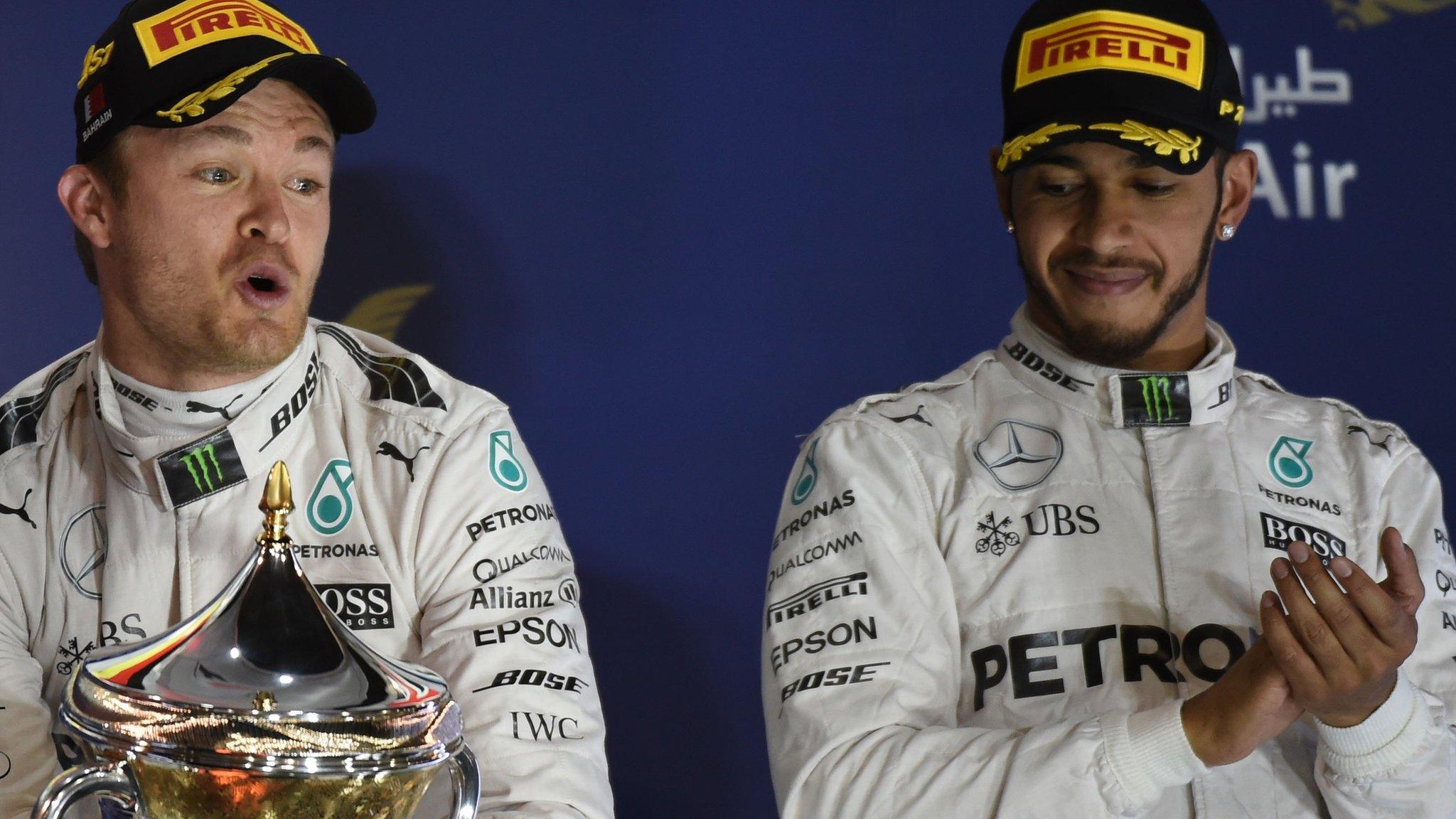
- Published6 April 2016
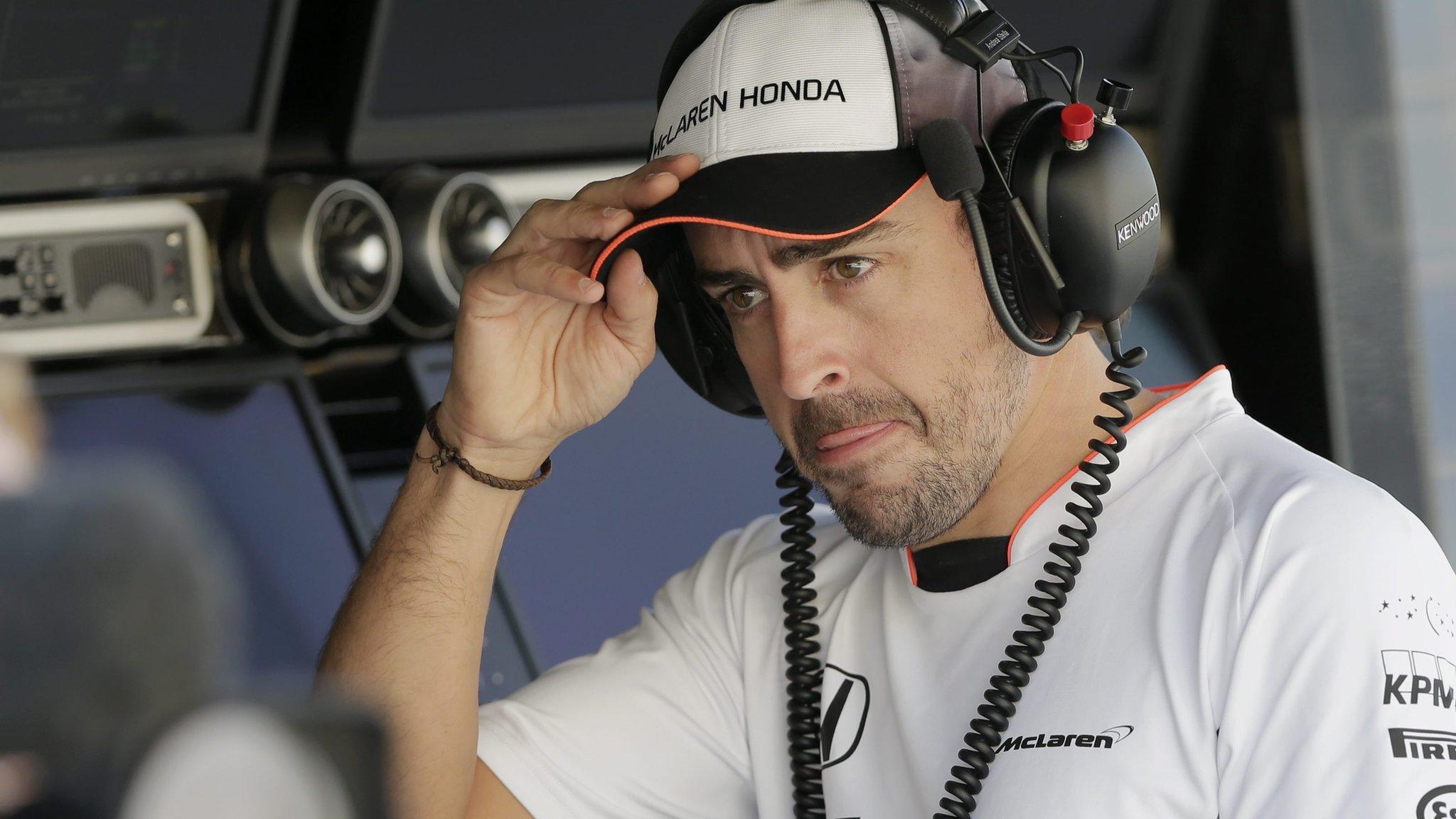
- Published17 April 2016

- Published4 April 2016
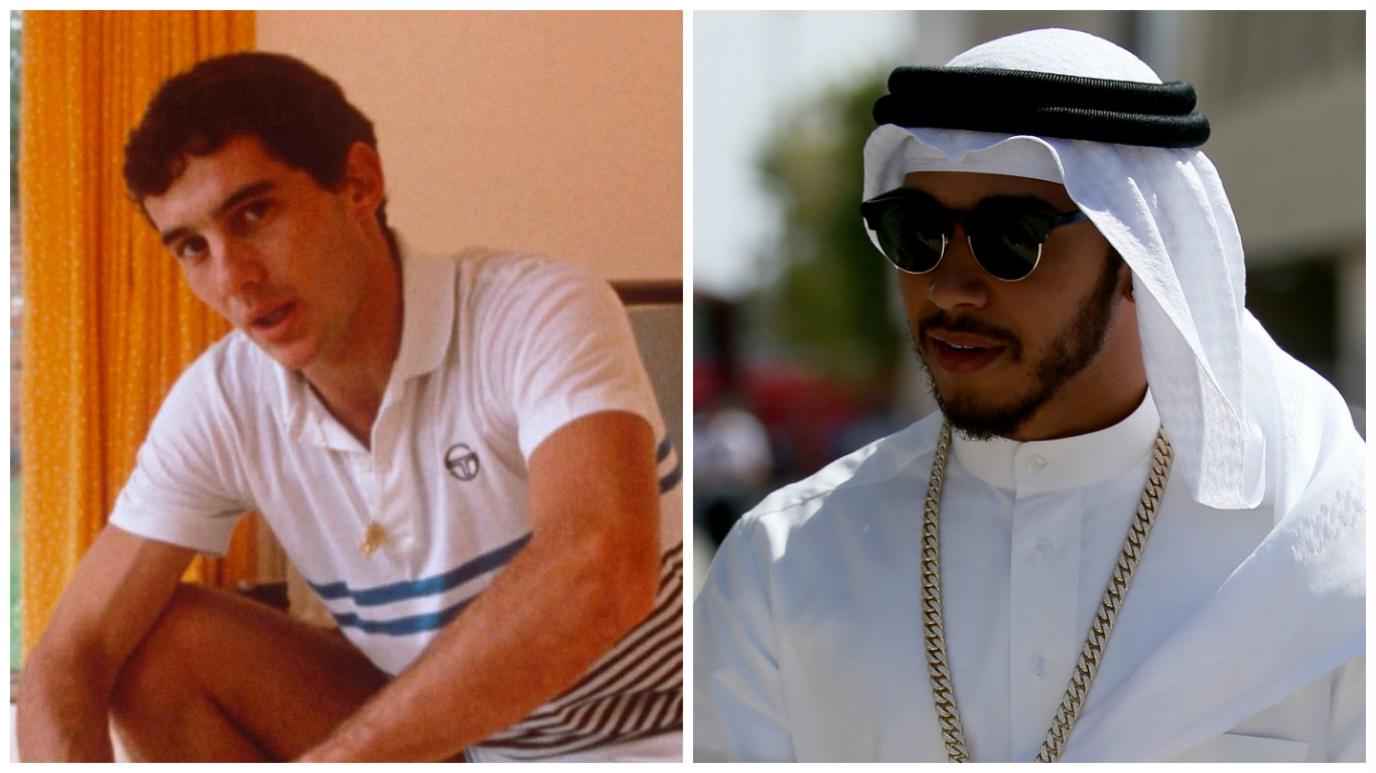
- Published18 December 2015

- Published2 November 2018

- Published26 February 2019
